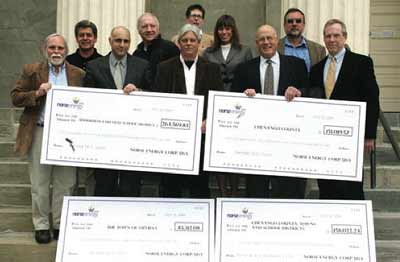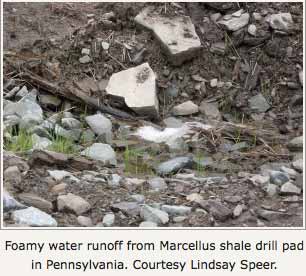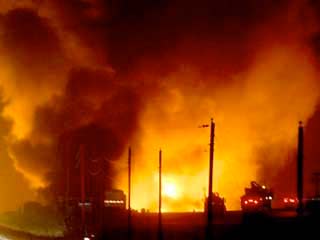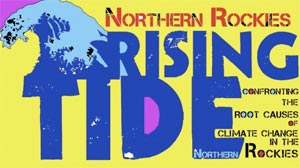Biblio
People who visited eastern Utah’s vast open spaces last winter might have thought they were doing their lungs a big favor by taking a deep breath of fresh, country air. But it turns out, they would have been better off going to Los Angeles or most other major cities.
According to new air-pollution data, breathing air around the oil and gas fields of the remote Uinta Basin was “unhealthy” on 40 days this past winter.
The problem was on par with the worst summertime ozone tracked by the U.S. Environmental Protection Agency (EPA) in the nation’s most polluted place, San Bernardino County, Calif. In addition, Uintah County’s ozone topped the worst high-ozone days in Salt Lake City and even industrial hubs such as Houston and Los Angeles.
See: The Case for a Truth and Reconciliation Commission on Toxic Hazards
See: Fracking: Implications for Human and Environmental Health
See: Living Downstream: An Ecologist's Personal Investigation of Cancer and the Environment
While our nation copes with the disaster in the Gulf of Mexico and the multiple failures of offshore drilling regulation that led to it, another potential fossil-fuel crisis lurks onshore.
Hydraulic fracturing, also known as "fracking," injects tens of thousands of gallons of water, sand, and chemicals at high pressure into underground rock formations to release natural gas. The injected fracking fluids are known to include a variety of harmful chemicals, such as diesel fuel, benzene, methanol, and formaldehyde. Even low concentrations of these chemicals can have severe health and environmental consequences, and they are being used near drinking water supplies...
...Some in the industry have said disclosure would reveal proprietary data. On the contrary, just as Coca-Cola must disclose a list of ingredients but not the details of its secret formula, our proposal would ask energy companies to share the ingredients of their fracking fluids but not the specific recipes.
Others have opposed federal regulation on the grounds that state regulations are sufficient. However, only a handful of states have fracking-fluid disclosure requirements, and some don't make the data public.
See opposing viewpoint from Energy in Depth, "House Call on the FRAC Act".
Photo: WBAI | Law and Disorder Radio. March 16, 2009.
Theater and film director Josh Fox's documentary Gasland explores the new generation of natural gas drilling, which for a decade has been blasting its way east across the country, tapping shale formations from the Rockies to Pennsylvania, and is now expanding in New York.
Fox is only 37, but he is a veteran explorer of complex themes from militarism to war to globalization and torture who skillfully blends artistry and social message. Gasland is more straightforward than Fox's earlier experimental mixes of theater, dance, music and film, but no less striking.
Nora Eisenberg holds a PhD from Columbia University in English and Comparative Literature and directs the City University of New York's Faculty Fellowship Publication Program for emerging scholars.
Native Americans like the Onondaga, a member nation of the Haudenosaunee Iroquois Confederacy and long leaders as healers of the environment face a new threat: hydraulic fracturing, or fracking.
Complaints have soared as fracking has expanded across the country. “Every state where this is going on, people’s water is contaminated,” said Joseph Heath, general legal counsel to the Onondaga Nation.
“The permanent disruption of peoples’ homes, lives, and communities is heartbreaking,” said Jeanne Shenandoah, Eel Clan elder and member of the Haudenosaunee Environmental Task Force who, with several HETF representatives and Onondaga members visited communities impacted by fracking.
“It impacts huge amounts of land and creates roads through forests and fields. Spills and waste ponds pollute the surface of the land, and the water. Drilling accidents allow gas to migrate into peoples’ water wells and homes. Hundreds of trucks speed down narrow roads every day.”
Shenandoah said when the air coming from these sites gives people headaches and health problems, “you know it’s being polluted too. This cannot be allowed, for the sake of all living things.”
Mother Earth Journal is a project of environmental news reporter Terri Hansen. She welcomes your comments, and queries, or email feedback@motherearthjournal.org.
See: Indigenous Environmental Network
"A network of Indigenous Peoples empowering Indigenous Nations and communities towards sustainable livelihoods, demanding environmental justice and maintaining the Sacred Fire of our traditions."
The Oil Region Alliance of Business, Industry & Tourism (ORA) administers the Oil 150. The ORA is the manager of the Oil Region National Heritage Area.
The mission of ORA is to increase the prosperity and population of the Oil Region National Heritage Area, through the preservation, promotion, development and support of destinations within the Oil Region National Heritage Area.
This project was financed in part by a Pennsylvania Heritage Parks Program Grant from the Pennsylvania Department of Conservation and Natural Resources, Bureau of Recreation and Conservation, via Oil Region Alliance of Business, Industry & Tourism. Additional funding was furnished by the National Parks Service, the Oil Region Alliance, and the Petroleum History Institute.
The way natural gas promoters talk about their pet fuel, you’d think it was green as clover and safe as baby oil. After the deadly San Bruno, California, gas line explosion, however, hawkers like natural gas billionaire T. Boone Pickens have gone silent. No more calls to action and pleas to phone your member of Congress to demand bigger subsidies.
The quiet is welcome. Let’s use that space to talk about all of the drawbacks. We know how explosive plain old natural gas is (the photo here is of a 2007 blast–they’re not so rare), and we know that we have no idea where those big, aging pipelines are. National security and all that.
But it doesn’t stop there. The current rage in natural gas extraction is deep-drilling in shale formations, mostly in the Northeast and the West. Its dangers have been soberly reported, mostly by the online investigative website ProPublica. But even reports of flammable gas instead of water coming out of kitchen faucets in drilling areas doesn’t fire the imagination like 100-foot flames and victims so incinerated they can’t be found.
The deep drilling, called “fracking,” puts drinking water supplies at risk. It trashes the landscape, and uses vast amounts of fresh water, most of which cannot be reclaimed, to force the gas upward.
If, as Mr. Pickens hopes, Americans will take to automobiles powered by heavily subsidized natural gas, your local “gas” station would be a big potential neighborhood bomb. Some of that natural gas would have to be imported (yep, just like oil), in the form of heavily compressed liquefied natural gas, stored in gigantic tanks near shore or onshore until it’s warmed up and sent through a pipeline.
WASHINGTON, D.C., April 1st, 2010 -- In addition to opening up vast areas of our coastline to offshore oil drilling, the Obama administration yesterday elected to defend a Bush-era policy that allows unlimited amounts of our nation's treasured public lands to be used as toxic waste dumps for the multinational hardrock mining industry.
This decision -- in the form of a response to federal litigation filed by a coalition of conservation and Native American groups -- is completely inconsistent with earlier remarks by Interior Secretary Ken Salazar on the importance of updating our federal mineral policies to protect public lands.
"Increased oil and gas drilling off our coasts, and now unlimited toxic waste dumping on our public lands send the message that profits are more important than water, wildlife and communities," said Lauren Pagel, Policy Director for EARTHWORKS, one of the plaintiffs in the case against the regulations. She continued, "With this move the Obama administration, like the Bush administration before it, is abandoning clean water and communities in favor of gifts to extractive industries."
"The administration has claimed support for reforming one of the most outdated laws on the books -- the 1872 Mining Law -- yet they choose to perpetuate the gross giveaways to an already subsidized industry without regard for other valuable uses of the public's land," said Pagel.
She continued, "It's time for the Obama administration to walk their talk when it comes to our shorelines and our public lands, and responsibly balance resource extraction with protections for communities and taxpayers," said Pagel.
The Obama administration has decided against pressing for a temporary halt to Marcellus Shale drilling in Pennsylvania and New York, a key federal official said.
Brig. Gen. Peter "Duke" DeLuca, commander of the North Atlantic Division of the Army Corps of Engineers, last week declined a request from Rep. Maurice Hinchey (D-N.Y.) to use the federal government's vote on the Delaware River Basin Commission (DRBC) to seek a temporary ban on gas production in the Delaware watershed.
Hinchey wants drilling there to wait until the commission completes a "cumulative impact statement," but DeLuca said that could delay drilling for years...
...Hinchey wrote DeLuca on Sept. 9, saying he was alarmed that the DRBC is preparing to finish regulations -- which would allow production to start -- this year, before a cumulative impact study could even start. He asked DeLuca to use his seat on the commission to advocate for blocking development until after the study is done.
"It is difficult to understand how the DRBC can consider the release of gas drilling regulations without a comprehensive assessment of the possible impacts in the Delaware River Basin," Hinchey wrote...
Environmentalists say DeLuca is wrong when he asserts that the DRBC must balance environmental concerns with economic development. Jill Wiener, a leader of an upstate New York group called Catskills Citizens for Safe Energy, said the commission's mandate is to protect water quality.
"They owe their fealty to the river and the people of the basin," Wiener said, "not the economic health of a few leaseholders and multinational corporations."
But industry officials say DeLuca was correct to reject Hinchey's request.
"Just to be clear here, Hinchey was trying to use a federal agency to direct the actions of a regional water board for the purposes of preventing the development of natural gas in a state where he doesn't even live," said Chris Tucker, spokesman for Energy in Depth, a group of independent drillers. "Next thing you know, he'll be ordering the Army Corps to build levees around our well sites in Wyoming."
BILL NUMBER:S8129. Passed 48-9. Aug. 3, 2010.
See: Patterson Veto and updates on Marcellus Shale legislation from E2 Law Blog.
See: Solid Shale
Solid info for NYS citizens who want their grandkids to be able to walk on unpolluted ground.
This is the place to read about bills having to do with gas exploration and extraction that are under consideration, and then read what others think about them in the comments (or share your own thoughts!).
See Assembly Bill, A1322c. "An act to amend the environmental conservation law, in relation to environmental protection related to the drilling of oil and gas wells, and providing for the repeal of certain provisions upon expiration thereof".
Pictured in still frame: George Winner, who voted against the Bill.
See: Transcript (PDF 99k)
TITLE OF BILL: An act to suspend hydraulic fracturing; and providing for the repeal of such provisions upon the expiration thereof
PURPOSE OR GENERAL IDEA OF BILL: This bill seeks to place a suspension of any permitting for hydraulic fracturing low permeability natural gas reservoirs, such as the Marcellus and Utica shale formations to ensure adequate review and analysis of the effects of this type of drilling on water quality, air, environmental, safety and public health.
SUMMARY OF SPECIFIC PROVISIONS: This bill suspends the issuance of new permits for the drilling of a well which utilizes the practice of hydraulic fracturing for the purpose of stimulating natural gas or oil in the Marcellus Shale formation.
JUSTIFICATION:
The potential for development of natural gas drilling in the Marcellus Shale formation within New York State has created robust debate involving the interplay between job creation and protection of the environment. Stakeholders both in support and opposition to these developments are aggressively advancing positions that are expansive and highly controversial.
By delaying DEC's ability to issue permits until May 15,2011, this bill will provide the Legislature additional time to assess the true environmental impacts of horizontal drilling and hydraulic fracturing.
This bill will also allow the Legislature to properly deliberate the numerous concerns that have come forward during the public comment period on the Department of Environmental Conservation's draft Supplemental Generic Environmental Impact Statement (draft SGEIS).
The May 15,2011 date also ensures that the Legislature will have ample opportunity to act in the 2011 Legislative Session. Gas drilling carries with it risks of accidents, including blow-outs and hazards related to gas seeping from wells. There are also potential effects on the communities in which shale gas production is located, including traffic, noise, and an influx of transient workers. Air quality, road creation, and habitat destruction all need to be taken into account, but by far the biggest concern is water safety.
The large withdrawals of water required for hydrofracking could disrupt surface and ground water ecosystems, and improper management of drilling and hydrofracking chemicals, drilling waste, and wastewater could pollute surface water and/or groundwater.
Given the complexities of the environmental and policy issues under consideration, the need for a one year suspension on the permitting process for development of natural gas drilling in the Marcellus Shale formation cannot be overstated. This will allow for a thorough, deliberate and unrushed analysis of all factors involved.
PRIOR LEGISLATIVE HISTORY: New bill.
FISCAL IMPLICATIONS: None.
EFFECTIVE DATE: This act shall take effect immediately, and shall expire and be deemed repealed on May 15, 2011.
S8129B Votes
Ayes (48): ADAMS, ADDABBO, ALESI, BONACIC, BRESLIN, DEFRANCISCO, DILAN, DUANE, ESPADA, FARLEY, FLANAGAN, FOLEY, FUSCHILLO, HANNON, HASSELL-THOMPSON, HUNTLEY, JOHNSON C, JOHNSON O, KLEIN, KRUEGER, LARKIN, LAVALLE, LEIBELL, MARCELLINO, MCDONALD, MONTGOMERY, NOZZOLIO, ONORATO, OPPENHEIMER, PADAVAN, PARKER, Peralta, PERKINS, RANZENHOFER, ROBACH, SALAND, SAMPSON, SCHNEIDERMAN, SERRANO, SEWARD, SKELOS, SMITH, SQUADRON, STACHOWSKI, STAVISKY, STEWART-COUSINS, THOMPSON, VALESKY
Nays (9): AUBERTINE, GRIFFO, LANZA, LIBOUS, LITTLE, MAZIARZ, VOLKER, WINNER, YOUNG
Abstains (2): DIAZ, KRUGER
Excused (2): GOLDEN, SAVINO
NYSDEC Main Page on Marcellus Shale.
Hydraulic fracturing of the Marcellus Shale will require large volumes of water to fracture the rocks and produce the desired amount of gas. Each well may use more than one million gallons of water.
See: NYS Dept. of Environmental Conservation (NYSDEC): Bureau of Oil and Gas Regulation
NYSDEC is criticized for not having enough personnel to monitor gas drilling.
There is currently no Section Chief for the Compliance and Enforcement Section of the NYS Dept. of Environmental Conservation (NYSDEC) Bureau of Oil and Gas Regulation. Jack K. Dahl, Director. (518) 402-8056.
See: NYS Dept. of Environmental Conservation (NYSDEC): Draft Supplemental Generic Environmental Impact Statement (dSGEIS) on the Oil, Gas and Solution Mining Regulatory Program
The draft Supplemental Generic Environmental Impact Statement (SGEIS) for potential natural gas drilling activities in the Marcellus Shale formation was available for public review and comment through 12/31/09.
The draft SGEIS supplements the existing Generic Environmental Impact Statement (GEIS) and analyzes the range of potential impacts of shale gas development using horizontal drilling and high-volume hydraulic fracturing.
The draft SGEIS outlines safety measures, protection standards and mitigation strategies that operators would have to follow to obtain permits.
Comments - The public comment period ended on 12/31/09 and the Department is now evaluating the many comments received. Watch this page for updates.
State of New York, Department of Environmental Conservation (NYSDEC). 2009. Draft Supplemental Generic Environmental Impact Statement (SGEIS). (804 pages, PDF, 22.77 MB)
What is wrong with New York in regards to gas drilling?
See: The U.S. Forest Service page below.
In New York, the Finger Lakes National Forest - Projects & Planning page contained no information on Oil and Gas Leasing.
"Northern Rockies Rising Tide is a chapter of the international, decentralized, grassroots movement Rising Tide. We are based out of Missoula, Montana, USA and work primarily on issues concerning the northern Rocky Mountains bioregion.
Rising Tide is an all-volunteer network of groups and individuals who promote local, community-based solutions to the climate crisis and take direct actions to confront the root causes of climate change. Rising Tide was born out of the conviction that corporate-friendly “solutions” to climate change will not save us and that most government efforts are half-measures at best. We organize through decentralized, local groups that support one another through shared resources, ideas, fundraising and training.
Northern Rockies Rising Tide is committed to stopping the extraction of more fossil fuels and preventing the construction of new fossil fuel infrastructure. Equally important, we believe that we must make a just transition to sustainable ways of living.
Rising Tide’s tactics are diverse and creative, taking a bottom-up approach to connecting the dots between colonialism, corporate power, social justice, biocentrism and the environment. The systems that are destroying the planet are systems rooted in oppression. Combating climate change is not solely a matter of carbon emissions, but of confronting the institutions that destroy communities, cultures and the Earth."
Norwegian based company with operations in the US. They own and operate pipeline systems in the northeastern US for gathering and transmission of natural gas. The CEO is Øivind Risberg.
NY Senate to Suspend Hydro Fracing Permits; Norse's Program Unaffected
On Aug. 5, 2010, the New York State Senate approved a proposal to suspend hydraulic fracturing of gas reservoirs in New York State until May 15, 2011.
"This proposed bill does not affect Norse's strategy of developing our estimated 500 Bcf Herkimer field. Actually, if anything, it could improve our strategic position as I anticipate a time limited moratorium on hydraulic fracturing shale permits would extend our lease term under the force majeure clause and allow us to hold more land with our ongoing Herkimer activity.
Our Herkimer drilling program is fully financed and as we now get back to drilling on our 3D seismic locations in the second half of the year, we anticipate our reserve based lending to further improve our financial position and allow for an acceleration of our Herkimer activity into 2011," said Øivind Risberg, CEO of Norse Energy.

See: Tyler Murphy and Melissa DeCordova. The Evening Sun. May 14-15, 2010. "Pro-natural gas drilling concerns say:We’re in the money"
Picture on the front page shows Norse Energy Vice President Stephen Keyes, City of Norwich Mayor Joseph Maiurano, Village of Sherburne Mayor Bill Acee, Realtor Bruce Beadle, Town of Smyrna Supervisor James Bays, County Planning Director Donna Jones, Commerce Chenango President Maureen Carpenter, County Treasurer William Evans, County Consultant Steve Palmatier and Nornew spokesman Dennis Holbrook receiving $656,923 worth of "symbolic checks".
The municipality [Norwich, NY] is one of the first in Chenango County to reap the financial benefits of natural gas development on an unprecedented local scale.
Norse Energy Inc., the Norwegian-based parent company of Nornew, has drilled 23 wells in the county, 13 in the Town of Smyrna since 2007.
The check’s amounts were based on the numbers released by the Chenango County Office of Real Property Services on May 1 and reflect the estimated assessed value using last year’s tax rates.
Pennsylvania based blog. Includes a quotes page unique to blogs on the environment, highlighting the struggle between citizens, corporations, and government regulations, providing a larger historical context.
It is horrifying that we have to fight our own government to save the environment. ~Ansel Adams
“In the woods we return to reason and faith”
Ralph Waldo Emerson
See: Fracked Dry
Over the next thirty years, given the present technology, 500 billion gallons of water will be retired underground in Pennsylvania through the process known as horizontal fracturing. This is according to email discussions I have had with Penn State’s Marcellus Center for Outreach and Research
500B is equivalent to 68 Harvey’s Lakes, or 263 Huntsville reservoirs, or 200 Wallenpaupacks (a relatively shallower but more expansive body of water).
This water will no longer be available for human use. It will lurk in the shattered caverns below. This dispersed sea will be waiting for a flaw, a break, an errant burst of pressure…
...Recently, EnCana Corporation was given permission to drill three “exploratory” natural gas wells in the Back Mountain, near Herb Baldwin's property.
This article appeared in the June 21, 2010 edition of The Nation.
When a well is fracked—each well is generally fracked up to ten times—between 15 and 40 percent of the mix flows back to the surface. Companies operating in the Marcellus, which is naturally radioactive, must find a way to dispose of thousands of gallons of water, toxic chemicals, brine and radium.
There are several ways things can go wrong, Horwitt says. Fluids can be spilled during transport, they can travel underground through natural or man-made fractures, or they can contaminate nearby areas if they're not stored properly...
Citizen action groups have popped up all over the Marcellus region, including the Shaleshock Action Alliance and the Pennsylvania-based Damascus Citizens for Sustainability, and around the country.
On May 26 As You Sow, a shareholder advocacy organization representing the Park Foundation of Ithaca, won support from a surprising 26 percent of shares at ExxonMobil's annual meeting for a proposal that would have required the company to disclose its efforts to reduce risks from natural gas drilling. "The Gulf oil spill is a powerful example of how oil and gas drilling can devastate the environment," Park Foundation executive director Jon Jensen wrote in a statement. "This is a good first step in responsibly seeking energy in a way that protects the environment, human health, and the welfare of the company."
See: As You Sow | Mixplex
See: Dusty Horwitt. (2009). "Drilling Around the Law Report." Environmental Working Group. 24 pages.
See: Exxon Confronts Nuns, Calpers Over Global Warming Plans, Boskin
February 2010 issue concentrates on major media environmental journalism.
In a memo leaked this summer from the Institute to its members, which its website boasts range from “the largest major oil company to the smallest of independents,” the trade organization’s CEO urged “oil companies to recruit their employees for events that will ‘put a human face on the impacts of unsound energy policy,’
...At the same time as they talk big about going green, the oil barons have waged highly organized disinformation campaigns going back decades to prevent legislative efforts to combat climate change (Mother Jones, 5–6/05). This fall, blogger Zachary Roth (TPMMuckraker, 11/4/09) noted that the American Petroleum Institute “has been a key opponent of serious efforts to address climate change, spending over $3 million lobbying on the Waxman-Markey climate change bill this year.” [The bill was approved by the House of Representatives on June 26, 2009 by a vote of 219-212]
According to the Sourcewatch article on the Bill, Brent Blackwelder, president of Friends of the Earth, praised the efforts by Waxman, Markey, and others to develop global warming legislation, but added that the bill had been "corrupted by members of Congress backed by oil and coal interests."
See: Ken Ward Jr., "Waxman-Markey update: A global warming crossroads?" Coal Tattoo, May 18, 2009.






















